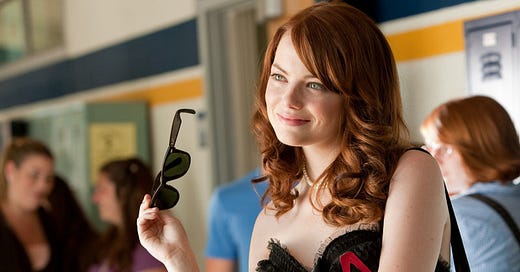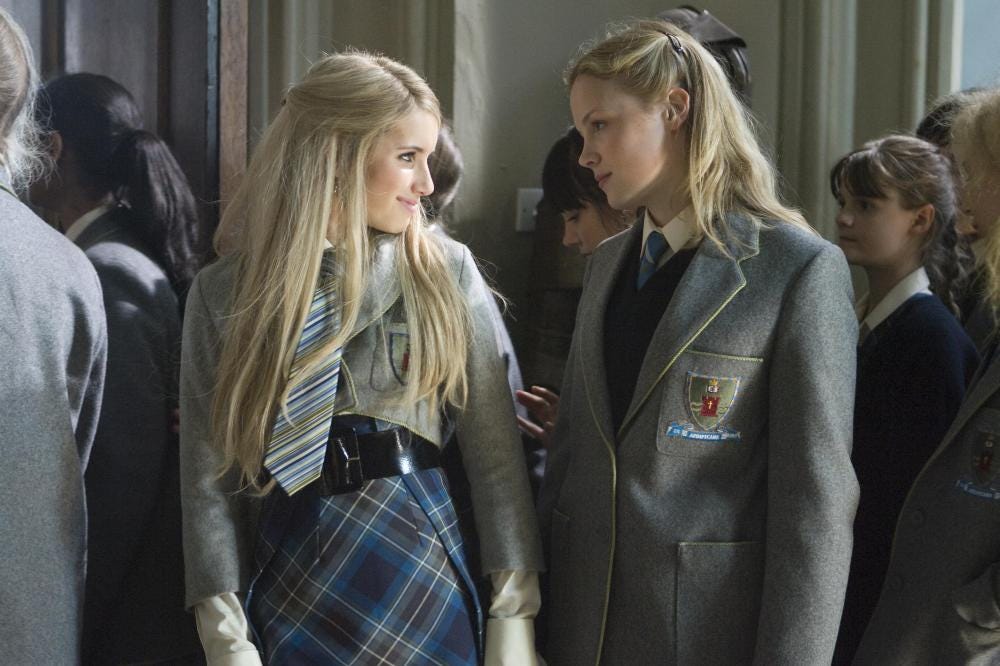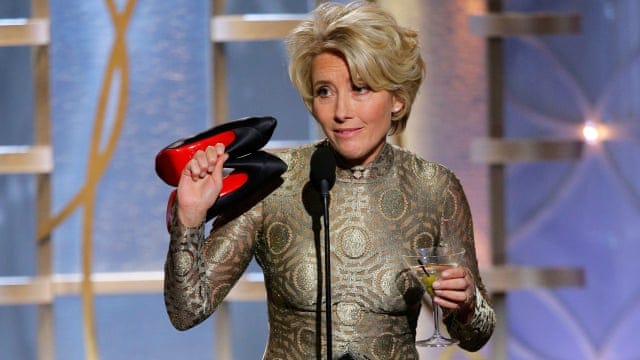It’s time to lay the “who’s the best Chris” discourse to bed. (It’s Chris Pine.) We had our fun, but now that the celebrity Chris Pratt apologists assembled, in the most embarrassing crossover event in history, to defend the tender feelings of a 41-year-old multimillionaire – well, it’s just not the same. Famous people made valiant efforts to ruin a lot of things in 2020 (including but not limited to: the song “Imagine” and the overt class commentary of Parasite) but butting into the Chris dialogue was particularly annoying. As a collective, they do not possess the range or the self-awareness to be on the Extremely Online side of the internet, and they proved it by wanting us to feed bad for liking a celebrity less than other celebrities with the same name as him. That’s what you’re going to use your platform for? In a pandemic?
All this is to say: it’s time to find a new homonymous cohort of celebrities to rate, and I propose the Emmas have their turn in the spotlight.
Emma Mackey
Mini Margot Robbie may be a relative newcomer to the Land of the Eminent Emmas, but she’s already made a splash with her breakout role as Maeve Wiley in Netflix’s British teen romp Sex Education. As Maeve, Emma Mackey (who was born in the same year as me, thanks for the inadequacy spiral) takes a role that could easily remain stuck in the one-dimensional rut of a Not Like The Other Girls archetype and imbues the dip-dyed, leather and combat boot-wearing Maeve with a transparent hunger to be known and liked. Striking the right balance between Maeve’s caustic and earnest moods and ensuring that we root for her through it all is no easy task. Emma Mackey pulls it off with ease.
And Maeve is just the beginning. Up next is Kenneth Branagh’s adaptation of Agatha Christie’s Death on the Nile, which is slated for a 2021 release, and Emily, Frances O’Connor’s directorial debut in which Emma Mackey will play Emily Brontë during the early years of the Wuthering Heights author’s life. A win for Girls Who Read™ everywhere! There’s a lot more to come in her career, so I’ll be keeping an eye out for this Emma on the rise.
Emma Watson
Emma Watson’s celebrity has eclipsed her on-screen presence since at least the fifth Harry Potter movie, making it distractingly difficult to forget that it’s Emma Watson I’m watching on screen. Of all her performances, the one that’s really stuck with me is her turn as the fictionalized Alexis Neiers in Sofia Coppola’s The Bling Ring. It’s not that the Emma Watson of it all was less inconspicuous in the role – rather, the self-awareness of the stunt casting itself contributed to the film’s irreverence.
In particular, the way she delivers the line, “I wanna rob,” is a career highlight. The blink-and-you’ll-miss-it moment is such a rich text: the hip pop, the body-con skirt, the weird way she’s holding the cigarette, the sheer number of neck rolls she manages to punctuate four measly syllables with, her palpable joy in playing a character other than Hermione for once and, most of all, her pronunciation – it’s not an accurate Valley Girl accent, but it sure is an effortful one. The combination of self-consciousness and commitment in this line reading (Iwunarawb) is as close to camp as The Bling Ring gets and as close to interesting as Emma Watson gets. If she never acts again, at least we’ll always have this.
Emma Roberts
She’s blonde, she’s skinny, she’s rich and, in her most famous roles, she’s a little bit of a bitch. I’d like to take this moment to thank nepotism for giving us an abundance of Emma Roberts performances to enjoy – from her teen heroine days in Unfabulous and Aquamarine to her spin on the dark side in American Horror Story and Scream Queens to her romcom dalliances in Holidate and Little Italy. She’s had a remarkably steady career for someone who became the star of her own show at 13, maturing into new types of characters and stories at each stage in her life and serving us attitude, wit, fashion and face through it all.
Personally, I’ll always think of her as Poppy Moore from Wild Child, which is British boarding school propaganda masquerading as a movie. Written by Lucy Dahl (AKA Roald Dahl’s daughter), the screenplay gestures vaguely towards a story and characters without actually doing the work of making Poppy and her exploits feel real. The best way I can describe it is that spiritually, it feels like it should’ve come from Wattpad. Maybe it’s just because I first watched it when I was entering my teenage years and we can’t help what our brains latch onto when we’re young, but I love it. I’ll think about Emma Roberts saying “When the head girl has earned my respect, then I’ll shake her hand, beyotch,” for the rest of my life, probably.
Emma Goldman
Here are some things that Emma Goldman, anarchist political activist and writer, was accused of and/or imprisoned for during her lifetime:
Plotting with her lover to assassinate the millionaire monopolist and union-buster Henry Clay Frick.
Illegally distributing information about birth control and giving lessons in public about how to use contraceptives.
Publishing writing that criticized the World War I draft and U.S. involvement in a war she viewed as an imperialist venture that profited capitalists at the expense of workers.
“Inciting to riot” AKA telling unemployed workers to take bread if the rich would deny it to them.
Praxis!
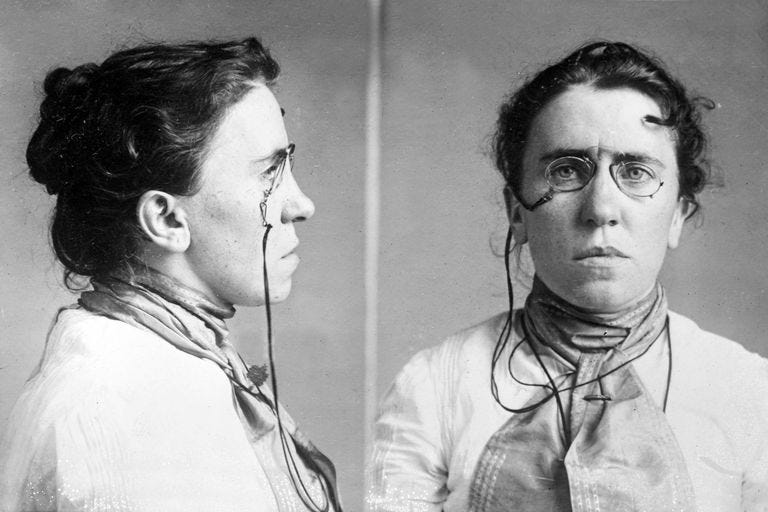
Emma Woodhouse
What’s more powerful than haunting pop culture for centuries after you first entered it? Emma Woodhouse, the eponymous heroine of Jane Austen’s 1815 novel Emma, has been reincarnated countless times since the Regency Era and is a ubiquitous figure in the Emma community. She’s made appearances everywhere from Bollywood and Hollywood to web series and the BBC, with actresses like Gwyneth Paltrow and Anya Taylor-Joy serving up their own interpretations of the character. So who, exactly, is Emma Woodhouse? Jane Austen famously called Emma “a heroine whom no one but myself will much like,” but being likable is not a prerequisite for being iconic. As the very first sentence of the novel tells us, she’s handsome, clever, rich and “had lived nearly twenty-one years in the world with very little to distress or vex her.” Our cultural appetite for stories about wealthy people is vast and varied, whether you fall on the side of contempt or aspiration, and Emma fulfills a particular fantasy about the rich and the beautiful – that they possess the ability to see their own privilege and are capable of wielding it to the benefit of those who have less power than they do. Emma’s journey from bored, lonely, manipulative and mean at the start of the novel to settled, in love and less manipulative and mean by the conclusion is a classic Austenian character arc that’s endured for over 200 years because it allows us to sand down the prickly edges of wealth into something that we can swallow more easily. Emma’s story is about coming of age in a world where the only real obstacles to her growth are internal – a concept that I find endlessly tempting in all its iterations, perhaps because of how little I can relate to it. Here’s to the eternal heroine and the Emma blueprint herself.
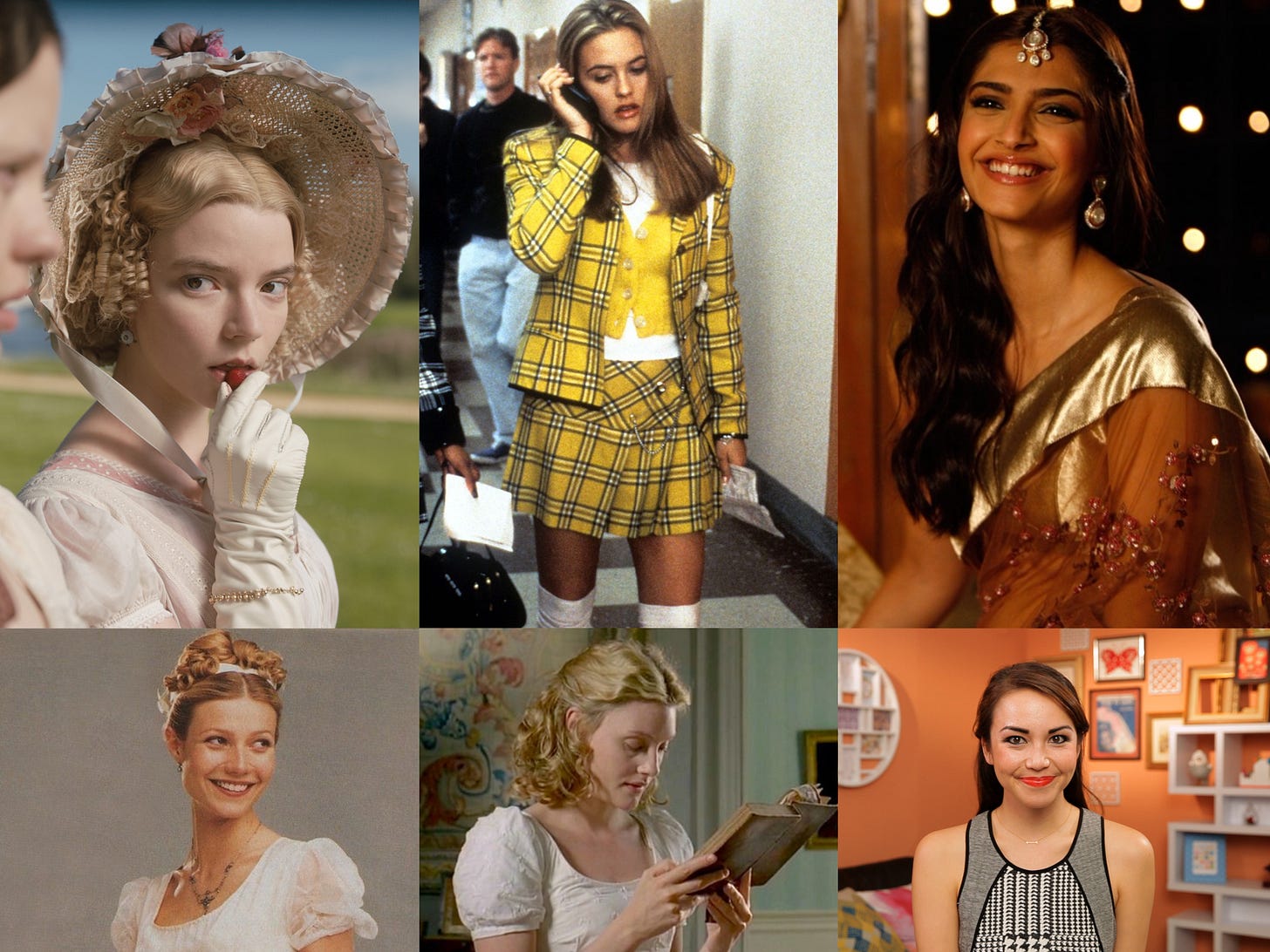
Emma Thompson
Dame Emma Thompson has everything you could ask for in a famous Emma: talent, charisma, elegance, career longevity, a romantic celebrity entanglement in her past (if you’d told 8-year-old Iris that Gilderoy Lockhart cheated on Professor Trelawney with Bellatrix Lestrange, her head would’ve exploded) and, above all, the range. Emma Thompson might have made a name for herself by starring in adaptations of highbrow British literature, but she’s never taken herself too seriously. Whether it’s Much Ado About Nothing or Love, Actually, she brings an innate decency and dignity to her roles that’s uniquely Emma Thompson. She’s a legend, she’s an icon, she is the moment and I thank her every day for her service in adapting the Sense and Sensibility (1995) screenplay and giving us the superior adaptation of that particular Austen novel.
Emma Stone
Much has been made about the decline (and, depending on who you ask, the death) of the movie star class. It’s all about IP and franchises now! One name is no longer enough to sell a product or a fantasy – let alone movie tickets! Or so the think pieces go. They’re probably right (“they” being people who are way more knowledgable about the history of Hollywood than me), but if movie stars are going extinct, then I’d say Emma Stone is the last of her kind. As a teenager, I watched her carry Easy A on her dress code-defying shoulders like it weighed nothing at all and knew that her name would be bolded on movie poster for years to come.
There’s a lot to love about Easy A – it’s a modern high school take on a literary classic in the tradition of Clueless and 10 Things I Hate About You, Patricia Clarkson and Stanley Tucci are the best movie parents to ever movie parent, Penn Badgley goes sans shirt more often than not – but when it comes down to it, it’s the Emma Stone show. Without her at the center, Easy A would’ve been yet another fun but forgettable attempt to recapture the magic of its high school romcom forebears. As Olive, Emma Stone embodies the persona that teenage girls aspire to and that adult women wish they could’ve been at that age – beautiful but inexplicably invisible to boys, secure in her unpopularity, in possession of a preternaturally dry sense of humor and destined for bigger and better things than her high school can provide. Her ability to make the audience see themselves in her without shedding her otherworldly movie star allure and her flair for turning the smallest of scenes into moments are why she’s the No. 1 Emma. Whether she’s singing along with a card that plays Pocketful of Sunshine, laughing in disbelief at Ryan Gosling’s abs in Crazy Stupid Love, delivering a diatribe against Michael Keaton in Birdman or fingering Olivia Colman in The Favourite, Emma Stone operates with a confidence and sensitivity that compels you to invest in her character’s story. There have been some duds in her track record, of course – the less said about The Help here, the better – but on the whole I’d say the highs far outweigh the lows. I still don’t really understand why we’re supposed to care about Cruella as a story (oh, to be a fly on the wall of the boardroom where “what if the Joker, but a woman who murders puppies?” was pitched) but casting Emma Stone in the lead role guarantees that if nothing else, we’ll get a dynamic, committed performance to anchor it in something resembling humanity. I started writing this post before the trailer for Cruella came out, and not even her accent work in that mess could make me waver in my ranking. Don’t ever doubt that I stand in solidarity with my Asian American sister Emma Stone, okay?

